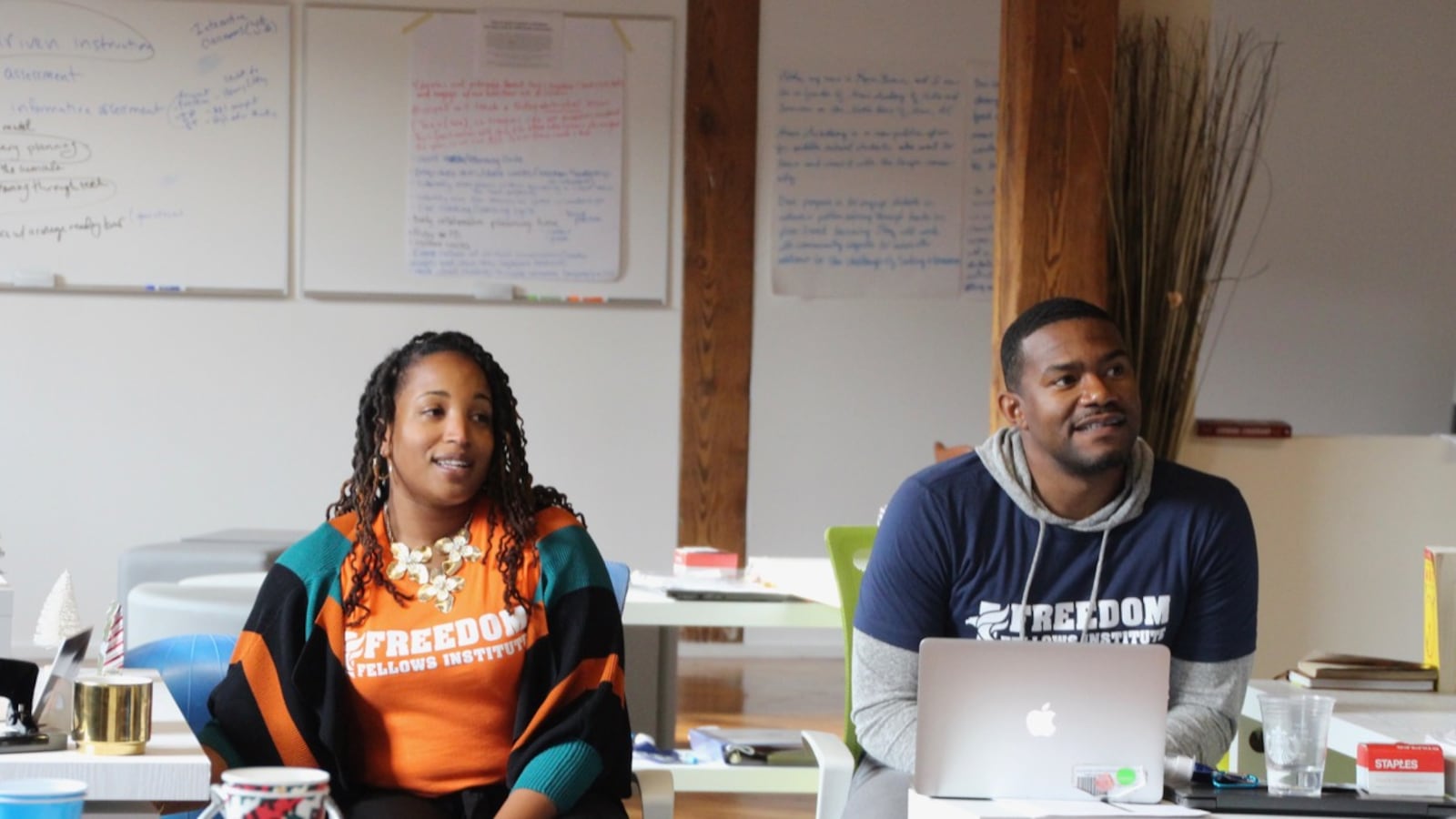An aspiring charter school founder traveled more than 4,000 miles to come learn in Memphis as part of Freedom Prep’s new fellowship.
Rana Boone, one of six inaugural fellows, wants to start a charter middle school in her hometown of Maui, Hawaii. Called Freedom Fellows Institute, the new program aims to guide leaders of color seeking to open charter schools in 2021.
“There’s so much that goes into starting a new school that few are prepared for,” Boone said. “To have two years of planning time, to get invaluable information on how to write a stellar charter application, how to put together your governing board of directors, how to think through the baggage of your own education journey, it’s just huge.”
The fellowship is Freedom Prep’s answer to calls for the 10-year-old charter organization to expand outside of Memphis, said founder Roblin Webb. It’s also her solution to getting more people like her, a black woman who launched schools where she grew up, into the charter business.
“I’m not keen on expanding out of the state knowing that we’ve still got work to do in Memphis in improving the things we’re not yet strong in and also just in Memphis education generally,” Webb said. “And so, the institute was my effort to help other states, especially black and brown children in those states, to get what they need to be successful and happy students.”
Freedom Prep operates four schools in Memphis made up mostly of black students, about 67% of whom come from low-income families. As part of the state-run Achievement School District, the network has significantly bolstered student and teacher retention and improved student test scores.
Related: How one Memphis charter school’s ACT scores jumped 2.6 points in one year
The fellowship aims to spread Freedom Prep learnings to other states, but it is unique in its focus on equipping people of color to create their own charter organizations in the neighborhoods they grew up in, said Mike Brown, the institute’s leader. Brown is a former Memphis principal who was most recently Freedom Prep’s chief of schools.
“So often, the answer in the education reform community to the struggles of education has been to go outside of those communities to find the answers,” Brown said. “And, while that was well intentioned, I think very rarely will the answer to a problem be outside of those who are most affected and impacted.”
Brown added that they also seek to help school founders avoid many of the financial and operational pitfalls of starting a new school.
About 200 charters close a year nationally, not only for academic shortcomings but for issues like flawed governance, or leadership and financial missteps, according to the Harvard Graduate School of Education.
Boone is the institute’s fellow traveling the furthest. Another is coming from Uniondale, New York, and the rest are from the Southeast, which Webb said is a priority region for the program. Two fellows are from Atlanta, another from Montgomery, Alabama, and another from Jacksonville, Florida.
The fellowship is paid for by the Walton Family Foundation (a Chalkbeat funder), New Schools Venture Fund, and the Charter School Growth Fund.
For Boone, the two-year fellowship, which provides a salary of $90,000 in the first year, is an opportunity she has been trying to find for years.
She was a school leader with IDEA Public Charters Schools in Houston before moving back to her hometown in Maui, where her sister also lives and teaches. The sisters have talked about opening a school focused on sustainable agriculture and marine biology for about a decade, but as full-time educators and moms, never found the time.
While Boone’s charter school, which would sit on land with its own beach, would look wildly different than any Memphis school, she said she wants to copy much of Freedom Prep’s culture and focus on equity.
“We spent an afternoon with teachers here in Memphis during the summer where, as their kick-off event, they toured the National Civil Rights Museum,” Boone said. “Teachers and school leaders had an honest conversation about what they learned and how to apply it in the classroom. That’s quite the way to ground educators at the start of the year.”
Fellows travel to Memphis almost two weeks out of every month to visit schools and train, and also occasionally travel outside of Memphis for school visits. The institute works with them on their charter applications their first year, and if approved in their home states, will work with the fellows throughout their second year to apply for grants and prepare.
Brown said the goal is to have about 24 fellows by 2022. He said the program was staying small to focus on quality, even though the program had more than 50 applicants for its first year.
“We understand the gravity of what we’re trying to do,” Brown said. “Whenever we’re talking about students’ lives being at stake or about their educational experience, students will never get it back if we do this wrong. They will never get these years back.”
For Anthony Bowden, a fellow co-founding a charter school in Atlanta with another fellow, this idea hits home. He wants to start a school with a greater focus on students’ socioemotional health than he had growing up.
“For me, it’s about celebrating and educating the whole child, not just the academic piece,” Bowden said. “I didn’t really see that growing up, and it’s so needed. I started teaching and didn’t see it. To have the chance to go into my own community to help provide it, I’m ready.”

